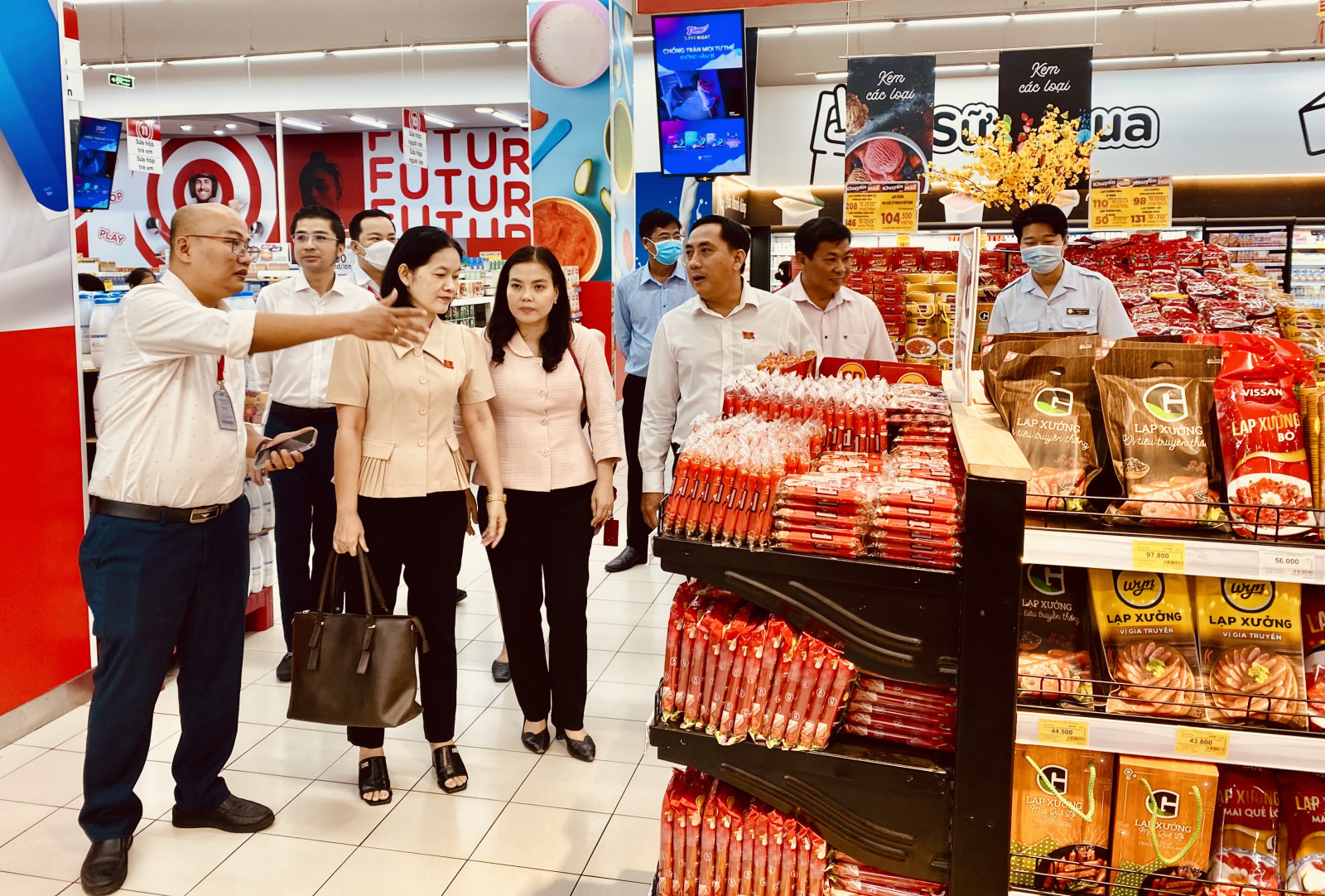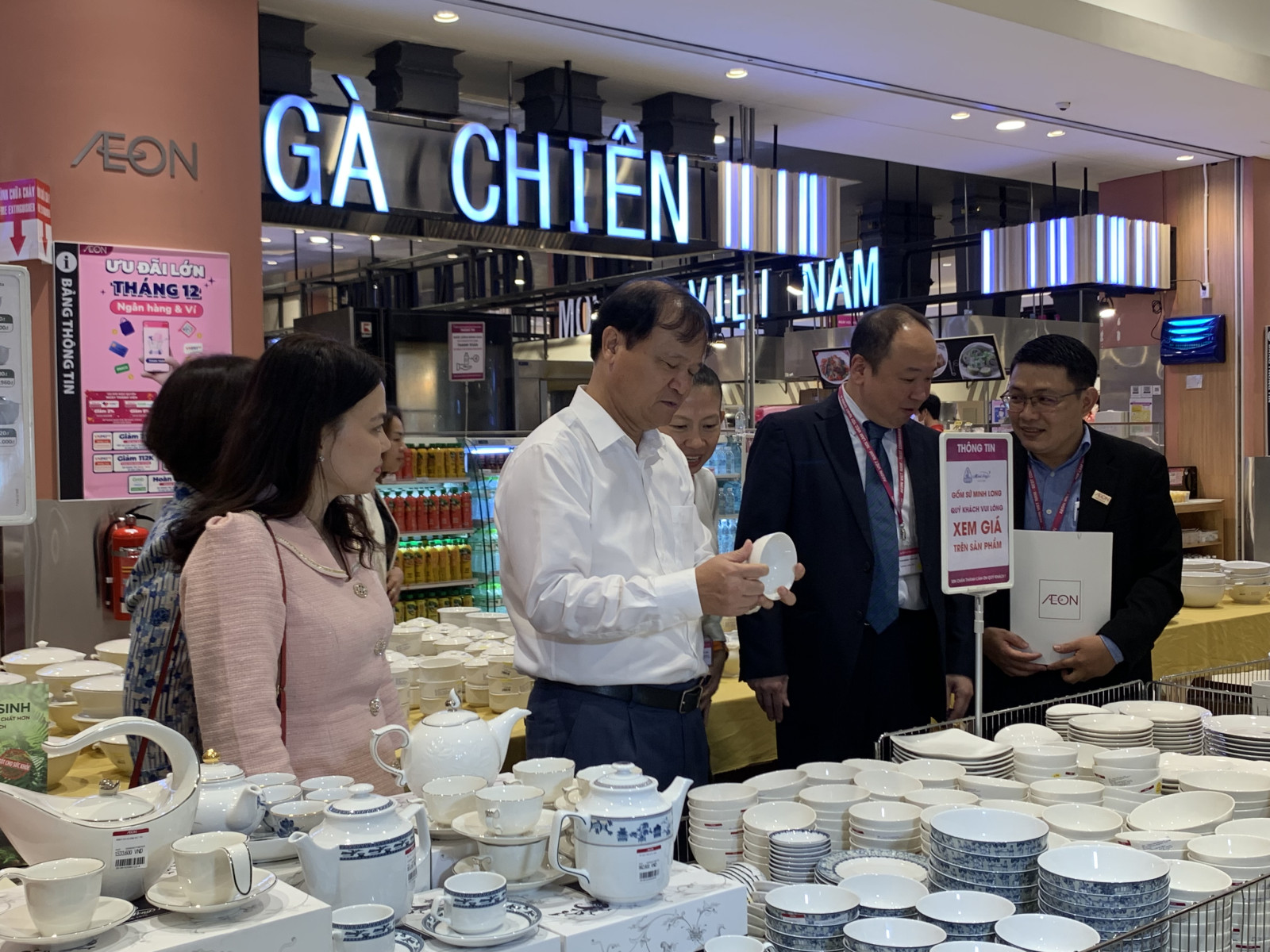Quality Vietnamese goods form links to dominate the market
Economic experts affirmed that Vietnamese goods still have plenty of room for both domestic and export markets. The most important thing is that manufacturers and distributors want to master the game that requires final products reaching consumers must have prestige, quality, competitive price, and the right trend.
Customers visit and shop Minh Long 1 ceramic products at Aeon Mall Binh Duong.
Catch the trend
According to Dr. Vo Tri Thanh, director of the Institute for Brand Strategy and Competition, the current difficulty of businesses is different from ones at the end of 2021 and the beginning of 2022. If during the Covid-19 pandemic period, businesses faced three difficult problems: cash flow, labor, and supply chain disruption, now the difficulty lies in accessing capital, rising input prices, lack of consumption market, orders drop. Therefore, to consume products, Vietnamese goods need a "handshake" of trade and connection between manufacturing firms and domestic and international retail distribution.
To support enterprises to dominate the local market, at a recent meeting with Binh Duong, Deputy Minister of Industry and Trade Do Thang Hai affirmed that the support provided for businesses to produce, trade, and consume products at home and abroad is very important. This is also a task assigned by the Prime Minister to ministries and branches, including the Ministry of Industry and Trade. Along with reviving exports, exploiting the domestic market is a solution to help Vietnamese businesses consume goods.
Sharing about the connection between the manufacturer and the distribution system, Hoang Long, purchasing director of Saigon Co.op in the Southeast region, said: “Saigon Co.op makes great efforts to bring quality Vietnamese products to customers with the desire that all products are in a closed chain. To achieve that goal, domestic supply is a top priority because of its availability, ease of transportation and storage as well as supply diversity.
However, to meet the requirements of consumers, in addition to ensuring food hygiene and safety and traceability, it also protects the interests of consumers. “Products reach distributors, put on shelves, and consumers buy the products, supermarket turns back to manufacturers and needs the efforts of the parties. In order not to be interrupted and lose connection, it does not only depend on the retail chain but also on the manufacturer, there must be a marketing policy, so that consumers can see the superiority and advantages of a product, to make more sustainable consumption”, Mr. Hoang Long talked about the direction of this prestigious retailer.
On the other hand, businesses mentioned changes in consumption trends after the pandemic. In the past, consumers bought high-value goods with a lot of money, after the pandemic they switched to spending on essential items for family. The second is to switch from a people's market to shopping at well-known stores and supermarkets. That is the guarantee of the quality of goods. Therefore, besides the criteria for importing goods such as quality, transparency, etc., sustainability is also very important and priority will be given to long-term partners. The longer-term cooperation creates a basis for firms to be assured to expand production and improve models; Distributors and retailers can also rest assured to import and better plan to promote their products, forming a sustainable supply chain between manufacturers, importers, distributors and consumers, avoiding disruption, interruption, affecting the supply of goods to the market.
However, in order to bring goods into the distribution and retail system, firms still have some limitations. Vo Nhat Vu, Director of GO! Binh Duong, said that Vietnamese businesses, especially small and medium enterprises, when distributing into the retail system, encountered some problems. Firstly, the product profile is often incorrect or incomplete, so it takes a long time to submit the offer. The second is that product packaging does not keep pace with market trends, so sometimes it does not meet the shopping needs of customers, difficult to pass the censorship stage to offer. "When cooperating, if products do not catch up, difficult to meet market demands, distributors cannot import the products to sell," said Mr. Vo Nhat Vu.

Functional industries survey products at GO! Binh Duong
Identify the right goal
According to Nguyen Thao Hien, Deputy Director of the European - American Market Department, Ministry of Industry and Trade, in order to put products into the distribution system, the most important thing is to identify the right products, the right markets, and the right distribution systems appropriate to their abilities and capabilities. Enterprises must determine that to put it into the distribution system it takes a lot of work, it is imperative to produce and do business in the most methodical and transparent way to be able to do business in the long run.
Nguyen Thai Phu, Director of TP Food Company (Thuan An City), said that in order to generate quality food, this firm has invested in modern production lines as well as built raw material areas and opened expand farms to cover from planting, harvesting to production, to have the most secure input. In addition to the domestic market, businesses also spend a lot of time and effort looking for customers in many foreign markets. In the early stages, it was difficult to reach customers, but through trade promotion programs, as well as the initiative in searching at global e-commerce sites, firms were able to connect with many partners and customers.
However, according to Mr. Nguyen Thai Phu, in order to put products on shelves of distribution systems in foreign countries and meet consumer tastes, firms must overcome strict criteria, and at the same time learn about culture and consumption behavior to produce suitable products. Currently, TP Food's products have come to the US market but still face certain barriers.
Reported by Tieu My - Translated by Ngoc Huynh


